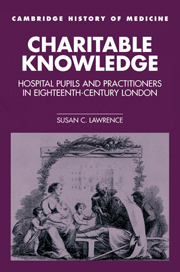Book contents
- Frontmatter
- Contents
- List of tables and figures
- Preface
- 1 Introduction: Hospital medicine in eighteenth-century London
- PART I INSTITUTIONS AND EDUCATION
- PART II COMMUNITY AND KNOWLEDGE
- 6 Gentlemen scholars and clinical cases, 1700–1760
- 7 London hospital men and a medical community, 1760–1815
- 8 Hospital men make medical knowledge, 1760–1815
- Conclusion
- Appendix I London hospital men, 1700–1815
- Appendix II London hospital pupils, 1725–1820
- Appendix III London medical lecturers, 1700–1820
- Index
- Cambridge History of Medicine
6 - Gentlemen scholars and clinical cases, 1700–1760
Published online by Cambridge University Press: 07 May 2010
- Frontmatter
- Contents
- List of tables and figures
- Preface
- 1 Introduction: Hospital medicine in eighteenth-century London
- PART I INSTITUTIONS AND EDUCATION
- PART II COMMUNITY AND KNOWLEDGE
- 6 Gentlemen scholars and clinical cases, 1700–1760
- 7 London hospital men and a medical community, 1760–1815
- 8 Hospital men make medical knowledge, 1760–1815
- Conclusion
- Appendix I London hospital men, 1700–1815
- Appendix II London hospital pupils, 1725–1820
- Appendix III London medical lecturers, 1700–1820
- Index
- Cambridge History of Medicine
Summary
On 1 May 1740, the Fellows of the Royal Society elected James Hawley, MD, to join them as an FRS. His nomination letter, exhibited at the society from 31 January to 24 April for his potential colleagues to examine, described Dr. Hawley as a
Member [FRCP 1739] of the College of Physicians & Fellow of Oriel College in Oxford. Now residing in Bow Street Covent Garden.
A Gentleman well skilled in Mathematicks, Natural Philosophy, & other parts of Polite Literature, is desirous of becoming a Fellow of the Royal Society, and is recommended as a person who is likely to become a Usefull Member thereof by us.
Signed by four relatively undistinguished members, Hawley's certificate followed a pattern already familiar to the Fellows: this man would fit in. In contrast, those had who nominated John Andrée the previous October had stated that he was a
Doctor of Physick residing in London; who among other ingenious Performances, has publish'd an account of the Tilbury Mineral Waters, and translated from the french [sic] a Treatise on the Venereal Disease, with a Dissertation on the Hydrophobia, and another on Consumptions, written by Dr. Pierre Desault, and being well Qualified, & desirous of the honour of becoming a Member of this Society, is recommended by us.
Andrée's supporters included Sir Hans Sloane, President of the Society, and Cromwell Mortimer, MD, its Secretary. Yet it was unusual to detail publications in nomination letters: perhaps this man did not fit in.
- Type
- Chapter
- Information
- Charitable KnowledgeHospital Pupils and Practitioners in Eighteenth-Century London, pp. 215 - 249Publisher: Cambridge University PressPrint publication year: 1996



